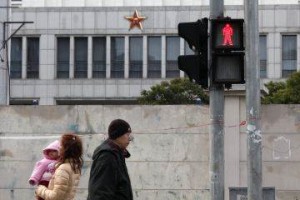CHINA AND US PAN DI HACKING TING
Hack Attack: China and the U.S. Trade Barbs on Cyberwarfare
By Hannah BeechMarch 12, 201319 Comments
CARLOS BARRIA / REUTERS
Chinese pedestrians walk in front of the building housing the secretive Unit 61398 of the People’s Liberation Army, on the outskirts of Shanghai on Feb, 19, 2013. The unit is believed to be behind a series of hacking attacks, a U.S. computer-security company said, prompting a strong denial by China and accusations that it was in fact the victim of U.S. hacking
The gloves are off. For years, the White House has danced around the sensitive topic of Chinese hacking into American computer systems that is believed to have compromised everything from electrical grids to the e-mail accounts of researchers focusing on China’s human-rights record. Public finger-pointing at Chinese hackers has been left largely to the American legislative branch or to private Western cybersecurity firms like Mandiant or McAfee, which have produced reports linking the Chinese military to online espionage. Even when U.S. President Barack Obama warned of the dangers of cyberwarfare in his State of the Union Address last month and then issued an executive order to protect America’s online borders, he declined to specifically name China as an offender.
No more. On March 11, U.S. National Security Advisor Thomas Donilon said that Chinese hacking had become a “key point of concern” in bilateral relations. “Increasingly, U.S. businesses are speaking out about their serious concerns about sophisticated, targeted theft of confidential business information and proprietary technologies through cyberintrusions emanating from China on an unprecedented scale,” Donilon said in remarks to Asia Society, a nonprofit organization based in New York City. “The international community cannot afford to tolerate such activity from any country.”
(MORE: China’s Red Hackers: The Tale of One Patriotic Cyberwarrior)
For its part, China has consistently denied any state-sponsored hacking campaign. Only two days before Donilon’s speech, China’s outgoing Foreign Minister Yang Jiechi lashed out at the U.S. for the recent drumbeat of accusations blaming China for cyberattacks. “Anyone who tries to fabricate or piece together a sensational story to serve a political motive will not be able to blacken the name of others or whitewash themselves,” he said at a news conference during the National People’s Congress, the annual Chinese leadership confab currently underway in Beijing. Yang went on to call for increased regulation of this new frontier: “Cyberspace needs not war, but rules and cooperation. We oppose cyberspace becoming a new battlefield, and to using the Internet as a new tool to interfere in another country’s internal affairs.”
On Monday, Chinese newspapers, which are guided by propaganda directives from the government, launched their own incursion against Western accusers. “The American government should make a self-examination first before it accuses other countries of such behaviors,” the Global Times, a Beijing-based daily, wrote, citing a Chinese international-affairs expert. “No country can compete with America in terms of its hacking ability.” The Liberation Daily, the mouthpiece of the People’s Liberation Army, noted that between November 2012 and January 2013, “China suffered 5,792 hacker attacks launched from the U.S., making the U.S. the No. 1 country hacking China.”
(MORE: Putting China’s ‘Hacking Army’ into Perspective)
It’s unlikely that the U.S. has no interest in infiltrating Chinese government computer networks. Internet experts blame the U.S. and Israel for having created and unleashed the Stuxnet virus to debilitate Iran’s nuclear program. Nor is China considered the only perpetrator of aggression in American cyberspace. Security professionals also accuse Iran, Russia and even allies like France and Israel, among others, for forays into American government and corporate computer networks. “We suspect many countries,” says Murray Jennex, a cybersecurity expert at San Diego State University. “It’s not like the Chinese are the only ones.” Still the number and variety of attacks blamed on Chinese hackers is expanding so quickly that the White House may have felt compelled to finally respond, particularly given Beijing’s adamant denials of any nefarious activity. As Donilon noted, American businesses have become vocal about their concerns when dealing with China. “It’s common practice for [Silicon Valley] companies to reformat their computers any time they go to China,” says Jennex. “They don’t work that way in any other country.”
Meanwhile, in China, where more than half-a-billion wired citizens must contend with the so-called Great Firewall that filters online information the government considers sensitive, grim jokes circulated on local social-media sites. “The Great Firewall is very powerful,” went one. “Why cannot it stop the American hackers’ attacks?”
— With reporting by Gu Yongqiang / Bei
Read more: http://world.time.com/2013/03/12/hack-attack-china-and-the-u-s-trade-barbs-on-cyberwarfare/#ixzz2NPyvNdn2
2 Responses to CHINA AND US PAN DI HACKING TING
****RULES**** 1. Debates and rebuttals are allowed but disrespectful curse-outs will prompt immediate BAN 2. Children are never to be discussed in a negative way 3. Personal information eg. workplace, status, home address are never to be posted in comments. 4. All are welcome but please exercise discretion when posting your comments , do not say anything about someone you wouldnt like to be said about you. 5. Do not deliberately LIE on someone here or send in any information based on your own personal vendetta. 6. If your picture was taken from a prio site eg. fimiyaad etc and posted on JMG, you cannot request its removal. 7. If you dont like this forum, please do not whine and wear us out, do yourself the favor of closing the screen- Thanks! . To send in a story send your email to :- [email protected]

Leave a Reply